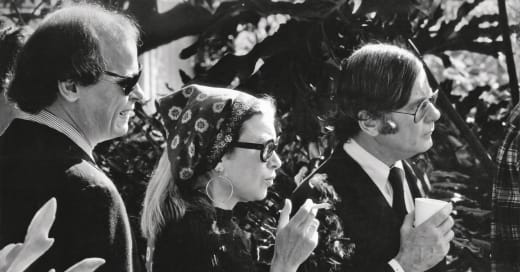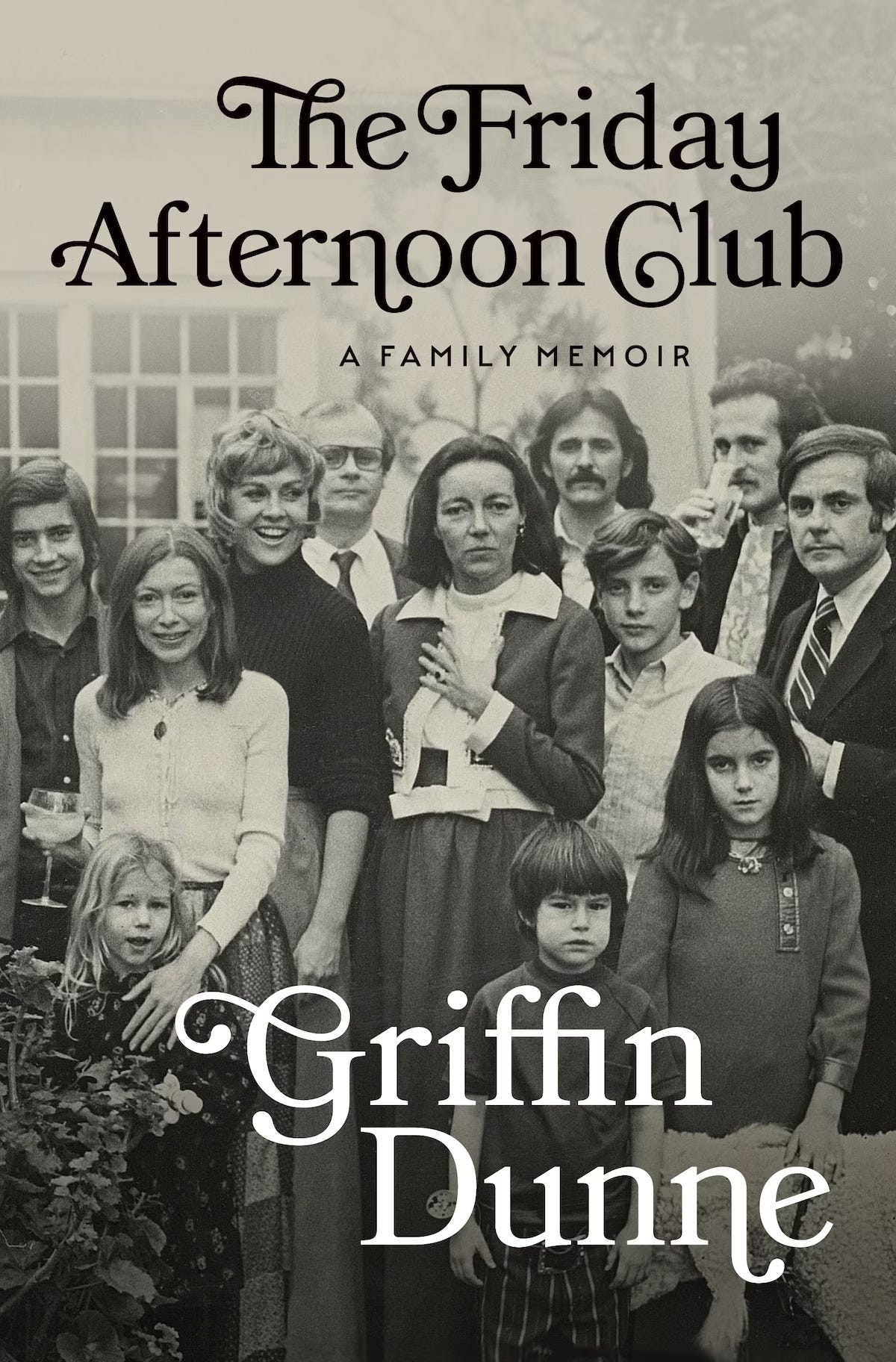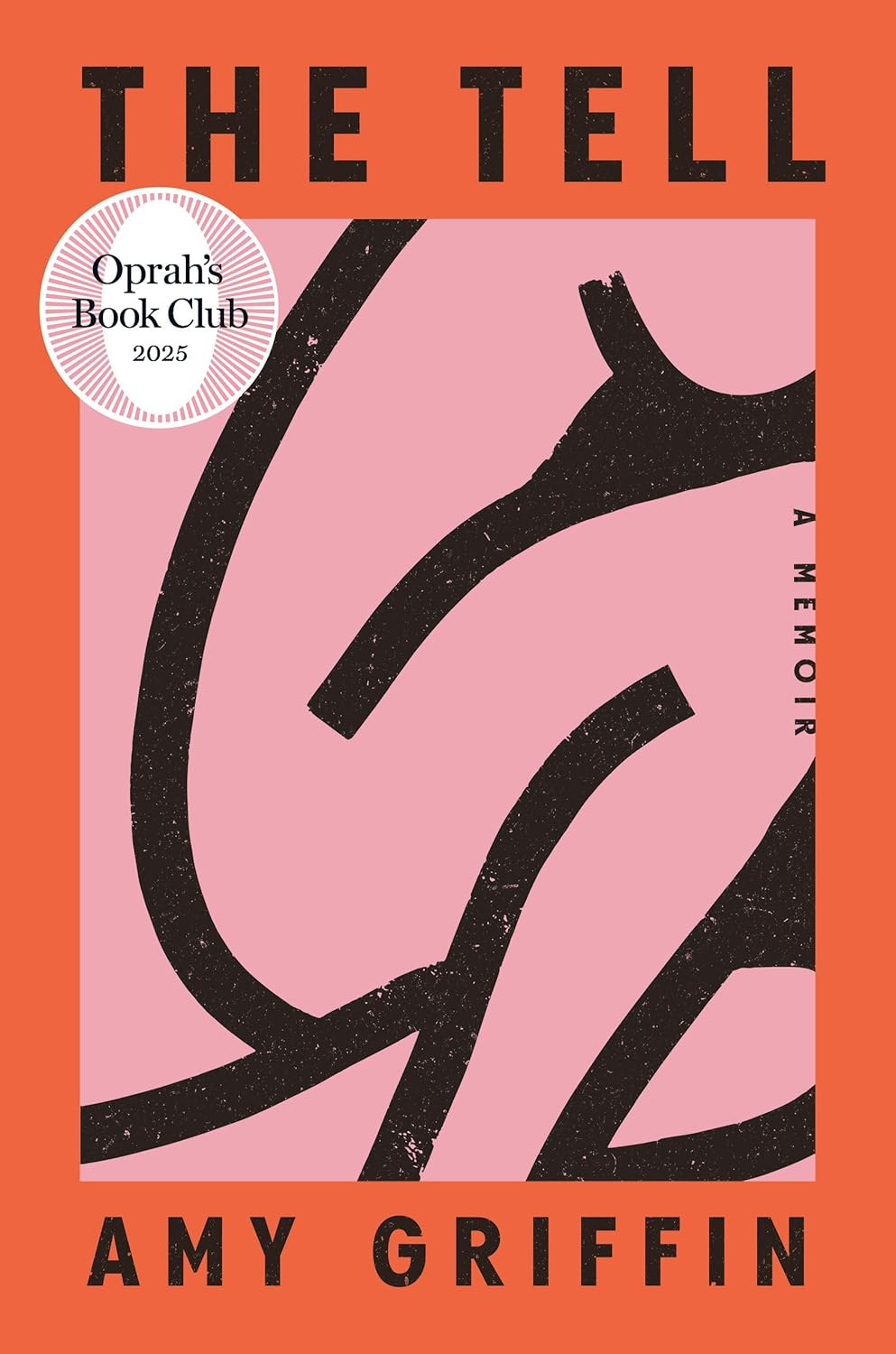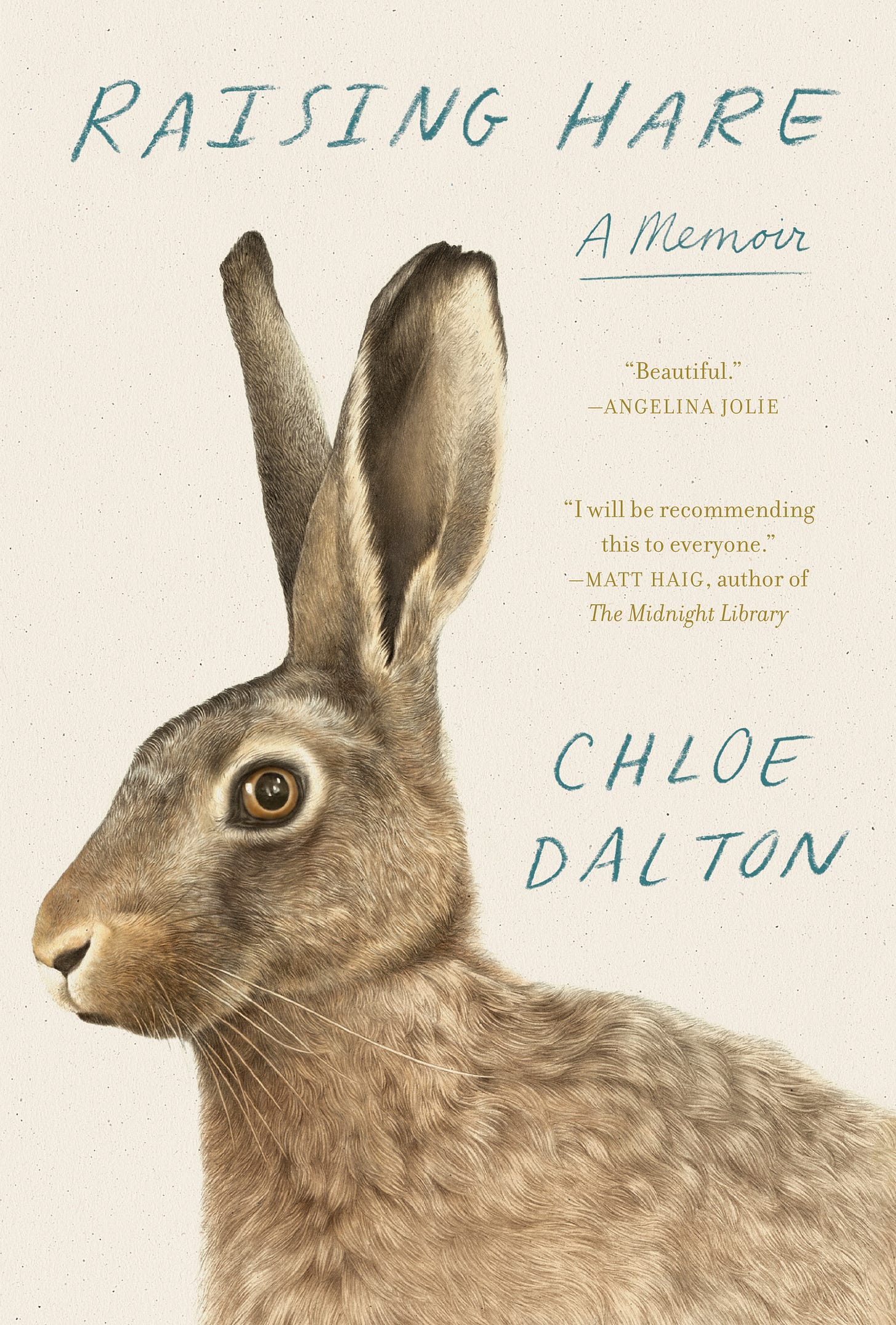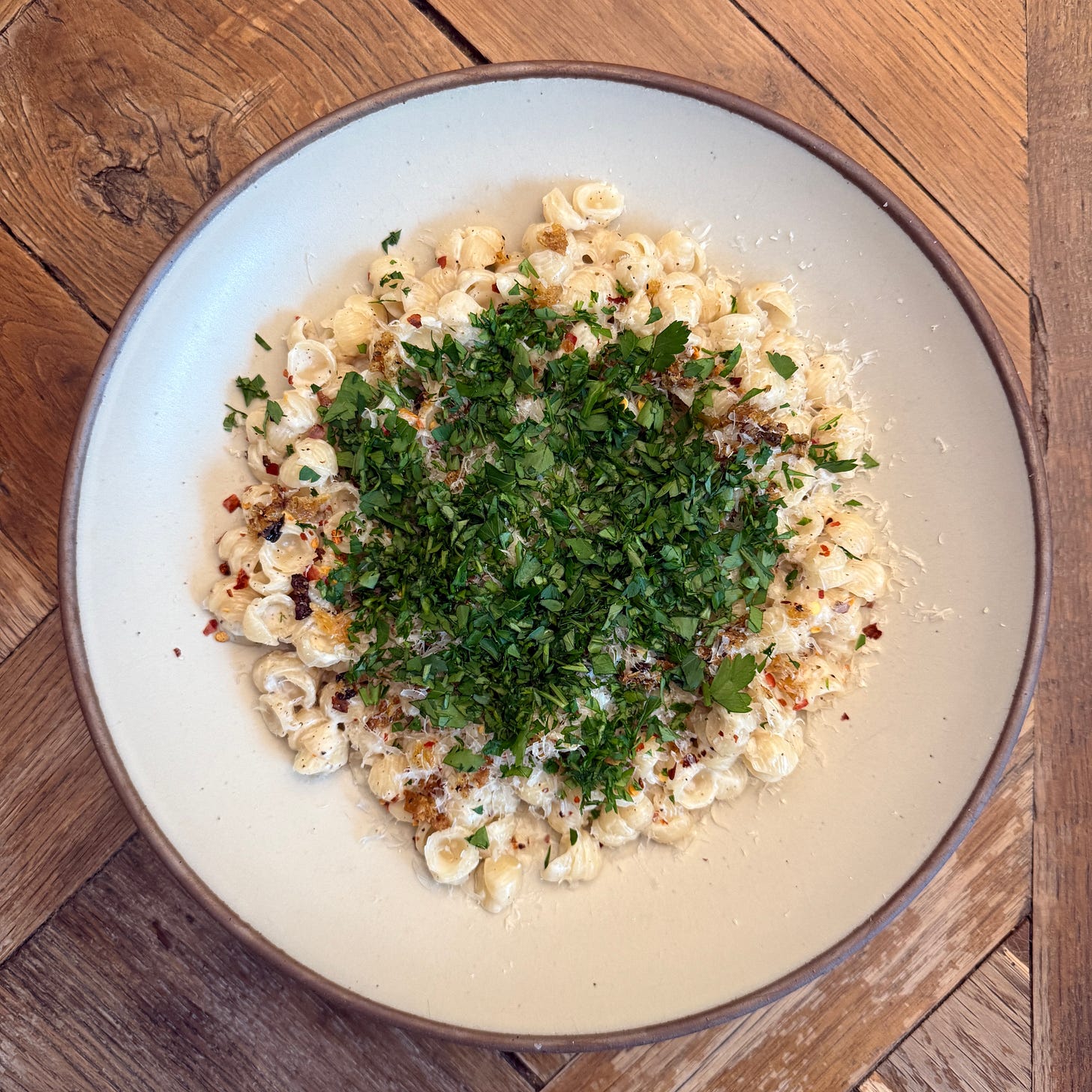Good morning! It was a big memoir week for me—I read three (!) memoirs and one contemporary fiction novel. Coincidentally, two of these books (The Tell and Dream State) are recent picks for Oprah’s Book Club. Let’s get into it.
read📖→
The Friday Afternoon Club: A Family Memoir by Griffin Dunne
The Friday Afternoon Club is a memoir by Griffin Dunne about his life growing up in the famous Dunne family. He chronicles his life until he turns thirty-four (when his child is born).
Overview: The first part of this family memoir follows Dunne’s coming-of-age in 1960s and 1970s Hollywood in his A-list family. His father was writer Dominick Dunne, and his mother was the Mexican American heiress Ellen “Lenny” Beatriz Griffin. John Gregory Dunne and Joan Didion were his uncle and aunt.
His childhood was filled with countless celebrity interactions. Sean Connery swam in his pool and saved him from drowning. Truman Capote brought the detective who inspired In Cold Blood to his parents’ tenth-anniversary party. Harrison Ford built Joan Didion’s deck. Griffin Dunne was best friends with Carrie Fisher.
But this family memoir isn’t just comprised of fun celebrity anecdotes. Dunne grapples with heavy themes like mental illness, violence against women, privilege, and addiction. The Dunnes were a complex and fragmented family. His father came out late in life, and his parents divorced shortly after their infamous tenth-anniversary party.
Both of his siblings had their lives cut short. His brother, Stephen, suffered from mental illness and ultimately died by suicide. Griffin Dunne’s sister, Dominique, was murdered by an ex-boyfriend when she was just twenty-two. The second part of the book focuses on Dominique’s murder trial and is more sobering.
Opinion: I didn’t know much about Griffin Dunne going into this book other than that he was related to Joan Didion. A quick IMDB search revealed that I know him best from This Is Us (he played Nicky Pearson) and Practical Magic (which he directed). But anyway, enough about me and my search history.
The Friday Afternoon Club is an engaging read. Dunne has a comedic and self-deprecating voice. I found elements of his adolescence to be a bit repetitive (he spends a lot of time on his sexual maturity). However, he is undoubtedly a gifted storyteller. He plays with the nature of storytelling throughout the memoir. As Dunne writes:
I had been brought up on stories told by people who loved to tell stories. I would become a person who played fictional characters on the stage or screen in other people’s stories, raised by a family who wrote books and produced movies about people with stories to tell . . . . They were stories, not lies, and encouraged to be repeated.
Overall: I would recommend this memoir, particularly to someone who likes 1960s Hollywood lore or a family memoir.
Rating: 3.9/5
Genre: Nonfiction (Family Memoir)
Notable prizes/book clubs/lists: Best Book of the Year by Time, NPR
Page count: 400 pages
Audio: 12 hours 19 minutes
Movie/TV pairings: Once Upon a Time in Hollywood
The Tell: A Memoir by Amy Griffin
The Tell is a memoir by Amy Griffin about processing her childhood trauma and how the pressure of perfectionism affects women.
Overview: The Tell is divided into three parts: Running, Remembering, and Rebecoming.
From the outside, Amy Griffin’s life looks pretty perfect. She founded the venture fund G9 Ventures and was involved with the Bumble IPO, Spanx, and Hello Sunshine. She has a loving husband and four kids. She’s wealthy, successful, and athletic. She’s close friends with Sarah Blakely from Spanx and Gwenyth Paltrow.
In “Running,” Griffin writes that she has felt like she’s been running from something her entire life. Since an early age, she has dealt with her anxieties through achievement and perfectionism. While she is a supportive mother, wife, and friend, she is in some ways detached. Then, one evening, her thirteen-year-old daughter tells her that she feels like she doesn’t know her:
“We know you do everything for us. You make sure everything happens.”
“But we don’t feel like we know who you are,” Gigi said. “You’re nice, but you’re not real. Do you have any idea how hard it is to have you as a mother? You do everything perfectly. You make everything look so easy. How are we supposed to relate to you?”
“Perfect is not my goal,” I said. “I don’t know what perfect even means.” Yet even said this, I knew it wasn’t true. Perfect had always been my expectation for myself. But hearing my daughter say it aloud bothered me, the way it always had when strangers told me I had the perfect life. I had indeed been raised to be perfect, but also not to draw attention to the quest for perfection. Perfection must look effortless. Being noticed for it invalidated it. The nuance was subtle but crucial—a distinctly southern twist on an old high standard. Had I passed all that on to my daughters? The thought disturbed me.
“I’m just trying to be there for you,” I said.
“You’re here, but you’re not here,” Gigi cried. “Where are you, Mom?”
This conversation helps prompt Griffin to go to therapy and unravel the mystery of her memories. Through psychedelic therapy, Griffin remembers her childhood trauma that she had blocked out.
In “Remembering,” Griffin details how she processes her suppressed trauma. In “Rebecoming,” she writes about how she comes to terms with her life and past.
Opinion: The Tell just came out this month. I decided to read it after seeing that three queens of popular book clubs—Oprah Winfrey, Jenna Bush Hager, and Reese Witherspoon—had an event about the book.
The book blurb does not specify the nature of her childhood trauma, but I think it’s important to explain what type of abuse it is. I don’t think this is a “spoiler,” as Griffin hints at it at the beginning of her memoir—She was sexually abused as a child. I won’t go into more detail because Griffin slowly reveals the depth of the abuse as she recovers her memories. However, if you want/need to read more about the trauma before reading The Tell, you can do so here.
Books do not typically make me cry, but I cried ugly, hot tears. It is well-written and well-structured, and the descriptions of her abuse, while difficult to read at times, are not gratuitous. Griffin had a lot of resources to help process her trauma and a supportive and loving family, but I think this book is written in a pretty universal way.
This book is undoubtedly meaningful for the countless number of people who have experienced sexual abuse or other kinds of childhood trauma. But more broadly, Griffin eloquently explains the pressure of high achievement and perfectionism on girls and women.
Overall: I highly recommend this moving book, particularly to survivors of childhood trauma or women who struggle with perfectionism, although it can be an emotionally challenging read.
Rating: 4.5/5
Genre: Nonfiction (Memoir)
Notable prizes/book clubs/lists: Oprah’s Book Club (March 2025)
Page count: 288 pages
Audio: 7 hours and 40 minutes
Raising Hare: A Memoir by Chloe Dalton
Raising Hare is a memoir by Chloe Dalton about her experience caring for a newborn hare at her home in the English countryside during the pandemic.
Overview: Raising Hare opens with Chloe Dalton, a well-connected London-based political advisor and speechwriter, spending lockdown in the English countryside. On a cold day in February 2021, she finds a newborn hare (called a leveret) that had been separated from its mother. Dalton decides to take the hare in and care for it. She forms a deep bond with the tiny creature but also tries to maintain some distance and not treat it like a pet. While someone else in her position might have documented the hare on Instagram or TikTok or written a children’s book about the encounter, Dalton chronicles her experience with the hare over three years in this memoir.
Opinion: I chose to read Raising Hare after seeing (but not actually reading) several reviews, including those in the WSJ, NYT, Guardian, and the Times Literary Supplement. I was also drawn to the trendy, old-timey animal cover. This memoir is less of a traditional memoir than a more straightforward animal encounter book.
Dalton writes crisply and descriptively (“gunmetal grey” mornings and lush descriptions of her natural environment). It’s a very soothing read in that it is relatively low stakes—sort of like watching Downton Abbey. Dalton’s story is a micro illustration of our relationship to wildlife and how we can all slow down.
However, I don’t think this adds anything new to the animal encounter genre, and it underwhelmed me. I am actually a little bewildered by the fact that it has been so thoroughly reviewed in the press.
While Dalton describes the hare and countryside well, Dalton includes many quotes from literature and historical texts on hares and scientific information about hares and local plant life. These tangents interrupted the book’s flow and did not seem well incorporated.
I also wanted to learn more about Dalton and how this experience changed her. She writes that caring for and observing the hare gave her a new outlook on life: “The damp footprints she leaves on the floor on wet or dewy mornings evaporate within minutes. The emotional impact she has left, by contrast, is immense.” However, she never tells the reader anything about herself, so it’s difficult to understand how these lessons translated to her life post-lockdown.
I’m not saying that Dalton needed to include personal information for this book to stand out. Still, the lack of personal details, combined with sporadic jargon-heavy sections, made this memoir feel somewhat impersonal.
Overall: I was expecting more from Raising Hare, given the amount of press surrounding the book. I only liked this book, but I would recommend it to someone who loves animal encounter books or just wants a soothing read.
Rating: 3.4/5
Genre: Nonfiction (Memoir)
Page count: 304 pages
Audio: 6 hours 26 minutes
Dream State follows two families over fifty years in Montana.
Overview: The first part of the book is primarily set in Montana’s Flathead Valley in 2004. Puchner’s Montana is slightly fictionalized—the characters live in the fictional town of Salish, which is near Whitefish and Kalispell. Cece is planning her wedding to Charlie Margolis, a cardiac anesthesiologist, at the Margolis family summer home in Montana. The Margolis family was “everything she’d always wanted, a country unto themselves, with their own customs and traditions . . . . Just being around them made Cece instantly happy, even delirious.”
Cece stays at the house alone in the weeks leading up to the wedding while Charlie works in Los Angeles. Charlie asks his best friend from Middlebury, Garrett, to help Cece with wedding errands. A Montana native, Garrett has moved back to help care for his ailing father. He works as an airport baggage handler because it’s the only job he can get as a college dropout. He is a gruff, brooding character—“the most cynical person” Cece has ever met. Charlie has asked Garrett to officiate the wedding, even though Garrett does not believe in “the bourgeois conspiracy.” Then, everyone gets norovirus at the wedding, setting the next fifty years into motion.
The book’s second part follows Cece, Garrett, and Charlie into their 70s and explores the lives of their children—Jasper, Lana, and Téa—from early adolescence into adulthood. Climate change looms over their lives as glaciers recede and wildfires rage.
Opinion: Dream State was Oprah’s Book Club February pick, and I just got it off hold from my library last week. I didn’t have a lot of expectations for it, and I half-expected myself to give up after a few pages. I love a good family saga, but they can also really drag on.
Dream State hooked me within the first 10 pages. Reader, this is very hard to do. I devoured the first part, only breaking to have dinner. Puchner writes vividly. Cece, Garrett, and Charlie felt very real to me, and he does a good job illustrating male friendship (which somehow feels rare in modern fiction books). The setting probably made me like this book even more, as I’ve lived in the American West for several years and love to ski, which the characters do a fair bit of in Dream State.
That said, I was more mixed on the second half of this book. The first part is mainly set in 2004, with some flashbacks to Garrett and Charlie in college, but the second part covers the next fifty years at a pretty breakneck pace. I didn’t feel very connected to their children. I almost wish Puchner had just dedicated more time to the perspectives of aging Cece, Charlie, and Garrett and left out the younger generation’s perspective.
There’s a fair amount of drama in the second part, which becomes a bit exhausting. Puchner also leans heavily into future climate dread. In the future, the characters ski over thin snow cover and spend much time in N95s in wildfire smoke.
Towards the end, Puchner is heavy-handed with what he’s trying to tell the reader. The high-stakes family drama and climate change descriptions are the weakest parts of Dream State for me. Puchner’s writing strengths are in describing nuanced relationships, and those subtleties get lost in this increasingly convoluted plot. However, this book is very readable, and these plotlines probably make for a good book club discussion.
Overall: I would recommend this book to someone who wants an engaging family saga in the vein of Ann Napolitano, with the caveat that the book gets a bit convoluted and depressing toward the end.
Rating: 3.6/5
Genre: Contemporary Fiction
Notable prizes/book clubs/lists: Oprah’s Book Club (February 2025)
Page count: 448 pages
Audio: 13 hours 44 minutes
consumed 🎬🎧🗞️→
Scientists predict Alaska’s Mount Spurr is likely to erupt.
A pod of dolphins surrounded a space capsule off the coast of Florida.
Hermione Hoby’s piece on the growing trend of contemporary divorce narratives is an excellent piece of literary criticism. I read this a few weeks ago and am still discussing it. Hoby asks, “Why, when divorce in the US and the UK is at last widespread, destigmatized, and more legally unimpeded than ever, should it have this literary salience?” To her, what is puzzling is “that divorce has acquired increasing literary significance to the very degree that marriage has forfeited social meaning.”
I read in this Big Salad post that one writer swears by working to the soundtrack for Gone Girl, composed by Trent Reznor and Atticus Ross. As someone who can’t listen music with lyrics while working, this is a massive hack. I’ve been listening to soundtracks by Reznor and Ross all week.
cooked 🍳→
Spiced chickpea stew and homemade flatbread.
Sometimes, you just want Annie’s white cheddar mac with debatably too much garnish (parm, breadcrumbs, parsley).

